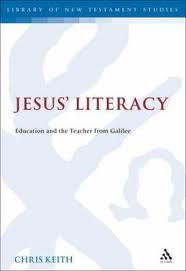The Jesus historian’s proper task is to explain the existence of the Jesus memories in the Gospels. (Chris Keith, Jesus’ Literacy: Scribal Culture and the Teacher from Galilee, p. 66)
 The question Chris Keith appears to overlook is how we know the Gospels do in fact contain “Jesus memories”. In fact, Keith’s book demonstrates, at least to my mind, just how far removed “Jesus historians” are from the mainstream of nonbiblical historical studies. (I am aware many biblical scholars would either deny or excuse this but that’s a topic I won’t address again in this post.)
The question Chris Keith appears to overlook is how we know the Gospels do in fact contain “Jesus memories”. In fact, Keith’s book demonstrates, at least to my mind, just how far removed “Jesus historians” are from the mainstream of nonbiblical historical studies. (I am aware many biblical scholars would either deny or excuse this but that’s a topic I won’t address again in this post.)
Keith rightly leaves aside the tool of authenticity criteria as a means of determining “what happened” (I have addressed core aspects of Keith’s argument on such criteria before) but has left a gaping hole at centre of his attempt to reconstruct the origins of Christianity.
While some would argue that Jesus did not “start” Christianity that seems not to be Keith’s view. As I read him he associates Christianity’s beginnings with the impact Jesus had in his (pre-resurrection) lifetime on his disciples. Indeed, he even blurs the distinction between the historical Jesus and the Christ of faith:
The overall implications of the Jesus-memory approach are significant. They challenge nothing less than the distinction between the historical Jesus and the Christ of faith. . . . [T]he Jesus-memory approach denies scholars’ abilities to separate cleanly the historical Jesus from the Christ of faith and properly returns historical investigation to why early Christians remembered Jesus in the manners they did. (pp. 69-70)
Keith’s colleague, Anthony Le Donne, at least acknowledged the necessity to somehow establish with some degree of independent verification (not just assumption) the existence of Jesus and reality of certain types of things he did. Le Donne admitted he had nothing but authenticity criteria to accomplish this, however, and Keith expresses some dismay over this return to a flawed method:
I disagree with Le Donne’s surprising appeals to criteria of authenticity. (p. 67 — Keith does acknowledge, however, that Le Donne modifies the claims he makes for these criteria by conceding they “cannot verify what actually happened” – p. 65 — only what “may have” happened, in effect)
Here is where I find biblical scholarship to be so removed from historical studies more generally. Ever since my undergraduate days I took it as a truism that all “facts” are at some level interpretations. Yet Keith attempts to explain at length why he believes that an “interpreted” event is somehow not, per se, necessarily “authentic”. He stresses what I and I am sure many historians have taken to be an obvious point — that every event we know about is transmitted through interpretations. Of course they are, but that does not deny the possibility of some sort of “objectivity” to the reality of those events. All we know about the Holocaust has come to us through interpretations of experiences and observations. But that does not mean we can say nothing stronger than that the Holocaust “plausibly happened”.
Keith speaks of our inability to have any “objective apprehension of past reality” and how the historian is always reduced to assessing “what is more or less plausible” (p. 66). I think Holocaust survivors have wanted something more than a claim like this in their defence.
Of course all human experience is interpreted, but that does not deny its objective reality at the same time. Continue reading “Memories of Jesus? (Or False-Memory Syndrome?)”
